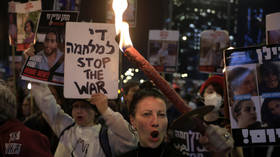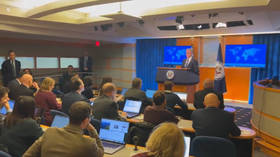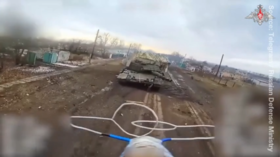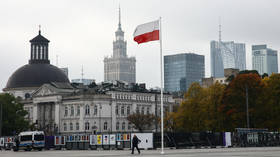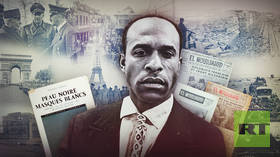Georgia’s fugitive president shares tips on police reform with US, fails to mention prison rapes, protest crackdowns on his watch
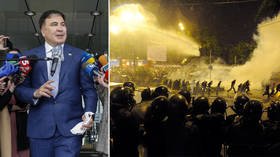
A self-aggrandizing piece penned by Georgia’s ex-President Mikheil Saakashvili offers Americans some common sense tips on how to reform the police based on a cherry-picked description of what he did at home.
The article published by Foreign Policy on Thursday explains how Saakashvili, in his own words, took control of a failed state in 2003 and overhauled its rotten police system into a highly popular institution, winning himself the title of the “world’s best reformer” from the World Bank in the process.
Alright who had Mikheil Saakashvili gives pointers to US on how to abolish the police on their 2020 bingo card https://t.co/GIrQKcRtGX
— Tim Hirschel-Burns (@TimH_B) June 11, 2020
The US may be different from Georgia, but it could do some of the things he did, Saakashvili argued. For example, make glass police stations for transparency. Or launch a good PR campaign to make the people like officers of the law. Somehow he failed to mention that his presidency was hardly an example of the rule of law and order.
It’s true that Saakashvili deserves the credit for rooting out much of low-level corruption in Georgia like extortion of bribes from motorists. He did it by sacking most of the people on the force and hiring new people, offering them reasonably high salaries and getting tough on corruption among officers.
Saakashvili very sharply reduced police corruption, which is a remarkable achievement, but left a track record of horrific human rights abuse in the police and other law enforcement agencies - not sure this is the model US really needs now...https://t.co/GEkJXTAoqu
— Max Fras (@maxfras) June 12, 2020
He also successfully cracked down on organized crime, enacting legislation modeled after the RICO Act of 1970 and going after people not directly involved in particular crimes. The Georgian president however employed some swiping and unorthodox methods to do so.
He de facto made it a criminal offense to call oneself a “vor v zakone,” a title that hardcore oldschool crime lords claimed and were code-bound not to deny if asked directly. Georgian police would approach such a career criminal with a camera and offer him a choice between going to prison for admitting to being one or being filmed breaching the unwritten rules of the criminal fraternity and losing all followers. This approach may have been effective, but it would probably not go down well with the American Civil Liberties Union (ACLU) if the US government tried it.
For those who don’t know much about me. My political research is ex-Soviet authoritarian regimes. What has happened in the last few days reminds me of Saakashvili’s violent dispersal of protestors using tear gas in 2007. It was authoritarian tactics. https://t.co/1f922mMave
— Mr. Spock 🖖 (Commentary) (@SpockResists) June 4, 2020
Saakashvili is also not the best person to ask for advice on dealing peacefully with mass protests. His preferred way to address those was to accuse Russia of being behind his critics and deploying riot police to disperse them with batons, water canons and tear gas. Although Saakashvili didn't get much scolding in the West for his tackling of the protests, even Human Rights Watch called it an excessive use of force after one day of protest in 2007 ended with at least 500 people requiring treatment for their injuries, including children apparently poisoned by the anti-riot chemical.
The turmoil in Tbilisi in 2011 was just as brutal and even led to the deaths of a protester and a police officer amid the chaos. Saakashvili’s government tried to pin the blame on his ally-turned-opponent, Nino Burjanadze, and charged her husband with “creating paramilitary groups and organizing attacks on policemen” during the protests.
Saakashvili’s reformist credibility is worst undermined by the state of his prisons though. A testimony to that is the 2012 scandal which sealed Saakashvili’s political downfall. Some prisoners in Georgia were subjected to systematic torture and even rape by guards while he was in charge.
Seriously, why entertain self-serving propaganda from Saakashvili any longer? This is what happened on his watch: pic.twitter.com/xsGjhFrY49
— Daniel Larison (@DanielLarison) June 11, 2020
When footage of the abuses was shown on national television, no amount of denials and talk of ‘bad apples’ could convince Georgians that what they saw was necessary to keep organized crime in check. On the contrary, the tapes gave credence to accusations of state-mandated persecution against political opponents and extortion of business people which critics of Saakashvili mounted against him.
President Saakashvili spent his last months as a lame duck after the parliament stripped his office of most powers. He has since been charged with abuse of power and corruption by the new Georgian authorities, reinvented himself as a Ukrainian citizen and politician, became enemies with then-President Petro Poroshenko and got kicked out of the country, and made a remarkable comeback lately as a reform adviser under President Volodymyr Zelensky.
Also on rt.com Georgia recalls envoy from Kiev as its ex-President Saakashvili, a wanted man back home, lands top govt job in UkraineHe may have some good advice on how to be a political phoenix. But tackling police brutality is probably not his field of expertise.
If you like this story, share it with a friend!



